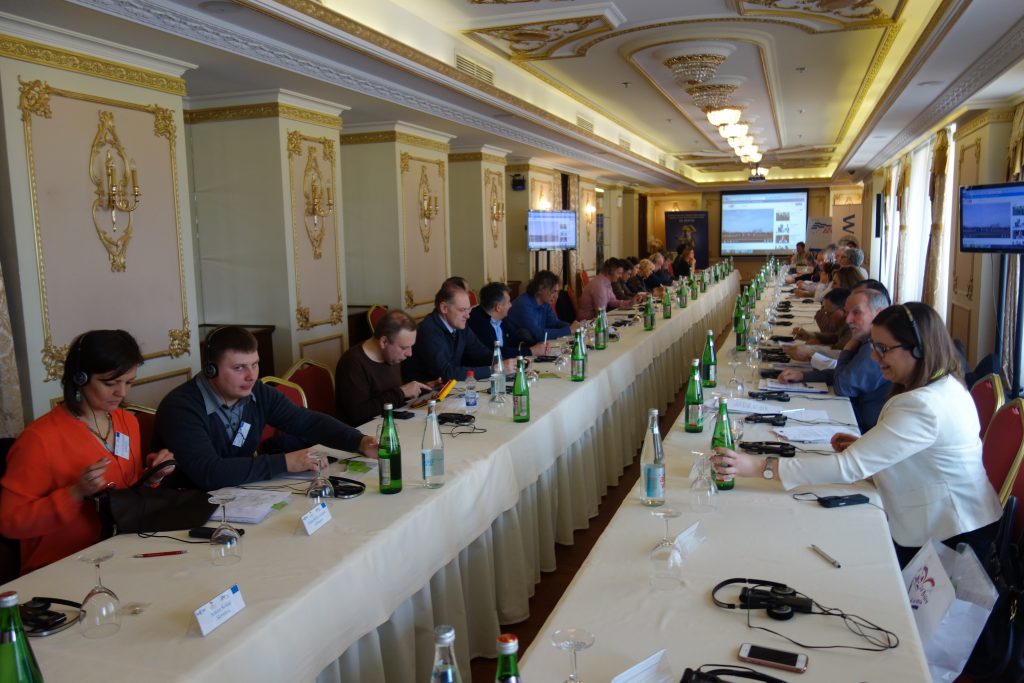The World Organization of Workers (WOW), in cooperation with the European Center for Workers’ Questions (EZA) and the Autonomous Trade Union of Employees in Banks, Insurance Companies and other Financial Organizations of Serbia (SS BOFOS), with the support of the European Commission organized a seminar on the theme: “Good practices for Healthy Workplaces: Let’s learn from each other”, which was held in Belgrade from 16 to 18 March 2017 at hotel Moscow.
The seminar focused on three important issues: the safety and health at work as an issue within the framework of social dialogue with the examples of good practice; the campaign of the European Agency for Safety and Health at Work 2016 – 17 Campaign: Healthy Workplaces for All Ages; as well as the prevention of stress as part of a set of issues related to safety and health at work. Sigrid Schraml, General Secretary of the European Center for Workers’ Questions (EZA), introduced EZA stating that their work is based on Christian values. Our goal is not only to transfer knowledge, but to enable people to act in accordance with the knowledge transferred. Bjørn van Heusden, executive secretary of the World Organization of Workers (WOW, said that the WOW has been EZA affiliate for many years.
The theme of the seminar is very interesting and topical, he said.Mara Erdelj, President of the SS BOFOS welcomed to all participants and opened the seminar.The seminar started with the contribution by Tsvetomir Tsanev. He stated that the European Agency for Safety and Health at Work – EU OSHA is a tripartite organization, that does not prepare legislation, butmerely spreads the information. Their current 2016–17 Campaign: Healthy Workplaces for All Ages; addresses challenges concerning health and safety at work in connection with age. The focus of interest is the collection of information. “We are witnessing the fact that people today live longer, the population is aging, the birth rate is low and older people are employed, and it is necessary to reform the pension system to reduce the burden on the government. The main objective of our campaign is to promote the sustainable work and healthy aging.
Miodrag Loncovi?, adviser in the Department for Safety and Health at Work at the Ministry of Labor, Employment, Veteran and Social Affair said that the largest responsibility is on the employer, because they need to provide a healthy working environment. Regarding health and safety at work, the Serbian law provides that there is a greater number of representatives of employees in comparison to those of the employers. A characteristic of our system is that all those who are engaged in activities related to health and safety at work need to pass the expert examination. Exposure to stress is one of the biggest risks in the workplace (as indicated by 53% of workers), 27% of workers suffer from stress, depression or anxiety caused or aggravated by work, said Loncovi? (Eurobarometer data (2014)). What the employer must do is risk assessment.
Zoran Nedeljkovi?, Executive Director of “Rudnik (mine) Flotation” and Ljiljana Obrenovi?, Advisor for Environmental issues of the same company, presented “The comprehensive implementation of safe and healthy working conditions for all employees with continuous application and amendment of the Act on risk assessment.” The new owner of “Rudnik” realized that workers were more valuable than thought before. “We are all children of the miners, and 70% of employees in the “Rudnik” are from the place in the vicinity of the mine.” With our unions, we agreed and came to the conclusion thatweall look at the “same side”. Successful privatization won. Rudnik” has introduced an integrated management system with which we better monitor production and security systems. Each worker receives a brochure regarding OSH and there is a constant training on OSH going on. Older workers have very good conditions for the extension of working life that is twice as higher earnings at newly found workplace than their pension if they retire.
Chris Walsh, executive director, Wise Age Ltd. and a member of the European organization AGE Platform Europe from Great Britain, said that AGE Platform is an excellent platform for the dissemination of good practice. Nowadays, 70 % of the employed in the UK are older than 50. Unfortunately, today we have a large number of unemployed who are older than 50, because when they get fired it is difficult for them to find new employment. If we are already being asked to work longer then the least we can do is to apply pressure in order to enable older workers employment. Older workers can become trainers, supervisors. Older workers offer support to young people. Societu as a whole should perceive them in a different fashion.
Dragoljub Božin, the Chairman of the SS BOFOS Statutory Committee and legal advisor, and the Chairman of the Health and Safety at Work Committee in the Vojvodjanska bank said that older workers were solid support in the productivity of each company. He pointed out that the active participation of employees in the OSH – was the basics of success of any management system; on the other hand the employer is obliged to consult with workers and their representatives and enable them to participate in the consideration of issues regarding OSH. The role of the OSH is consultative. It is essential to create with all employees a security instinct to recognize the risks to the safety and health at work and that is the role the Board of OSH, he said.
Helena Koren, a psychologist from the Croatian Institute for Health Protection and Safety at Work said that we became a 24 hour society, because we are available 24 hours a day to the employer. If a worker is constantly exposed to psychosocial risks he is exposed to stress as well. Psychosocial risks go beyond the content of work, work intensity, working conditions, organizational culture etc. Burnout is an extreme reaction to stress. Risk assessment must be made for psychosocial risks. Stress is a subjective experience, and that is why the risk assessment must include a worker. However, prevention measures cannot be implemented if the employer does not want to, said Helena Koren.
Jovan Proti, the ILO National Coordinator for Serbia pointed out that stress affects different individuals in different ways, and it is difficult for employers to determine its impact and to manage it. “Stress causes or increases health problems. The economic and social costs of stress are very high.”
for pictures click here





